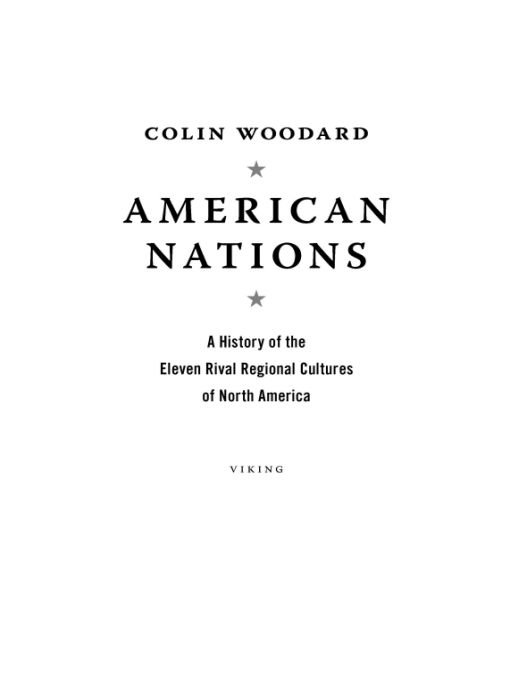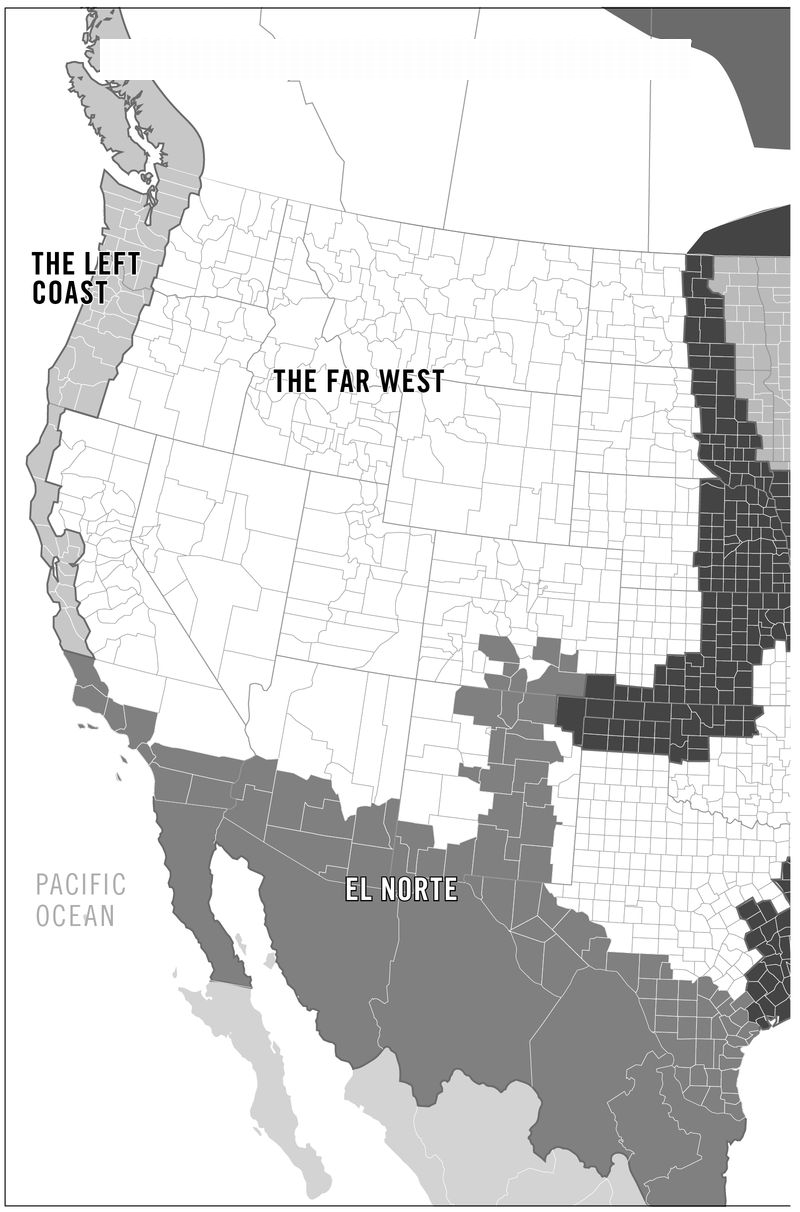Colin Woodard
Authors: American Nations: A History of the Eleven Rival Regional Cultures of North America
Tags: #American Government, #General, #United States, #State, #Political Science, #History



Table of Contents
Â
Â
Â
Â
Â
ALSO BY COLIN WOODARD
Ocean's End
The Republic of Pirates
The Lobster Coast
VIKING
Published by the Penguin Group
Penguin Group (USA) Inc., 375 Hudson Street,
New York, New York 10014, U.S.A.
Penguin Group (Canada), 90 Eglinton Avenue East, Suite 700,
Toronto, Ontario, Canada M4P 2Y3
(a division of Pearson Penguin Canada Inc.)
Penguin Books Ltd, 80 Strand, London WC2R 0RL, England
Penguin Ireland, 25 St. Stephen's Green, Dublin 2, Ireland
(a division of Penguin Books Ltd)
Penguin Books Australia Ltd, 250 Camberwell Road, Camberwell,
Victoria 3124, Australia (a division of Pearson Australia Group Pty Ltd)
Penguin Books India Pvt Ltd, 11 Community Centre, Panchsheel Park,
New Delhiâ110 017, India
Penguin Group (NZ), 67 Apollo Drive, Rosedale, Auckland 0632,
New Zealand (a division of Pearson New Zealand Ltd)
Penguin Books (South Africa) (Pty) Ltd, 24 Sturdee Avenue,
Rosebank, Johannesburg 2196, South Africa
Published by the Penguin Group
Penguin Group (USA) Inc., 375 Hudson Street,
New York, New York 10014, U.S.A.
Penguin Group (Canada), 90 Eglinton Avenue East, Suite 700,
Toronto, Ontario, Canada M4P 2Y3
(a division of Pearson Penguin Canada Inc.)
Penguin Books Ltd, 80 Strand, London WC2R 0RL, England
Penguin Ireland, 25 St. Stephen's Green, Dublin 2, Ireland
(a division of Penguin Books Ltd)
Penguin Books Australia Ltd, 250 Camberwell Road, Camberwell,
Victoria 3124, Australia (a division of Pearson Australia Group Pty Ltd)
Penguin Books India Pvt Ltd, 11 Community Centre, Panchsheel Park,
New Delhiâ110 017, India
Penguin Group (NZ), 67 Apollo Drive, Rosedale, Auckland 0632,
New Zealand (a division of Pearson New Zealand Ltd)
Penguin Books (South Africa) (Pty) Ltd, 24 Sturdee Avenue,
Rosebank, Johannesburg 2196, South Africa
Â
Penguin Books Ltd, Registered Offices: 80 Strand, London WC2R 0RL, England
Â
First published in 2011 by Viking Penguin, a member of Penguin Group (USA) Inc.
Â
Â
Copyright © Colin Woodard, 2011 All rights reservedÂ
Maps drawn by Sean Wilkinson, Sean Wilkinson Design
Â
LIBRARY OF CONGRESS CATALOGING IN PUBLICATION DATA
Woodard, Colin,âââââ.
American nations : a history of the eleven rival regional cultures of North America /
Colin Woodard.
p. cm.
Includes index.
Woodard, Colin,âââââ.
American nations : a history of the eleven rival regional cultures of North America /
Colin Woodard.
p. cm.
Includes index.
ISBN : 978-1-101-54445-7
E98.F39W66 2011
970.004'97âdc22 2011015196
Â
Â
Without limiting the rights under copyright reserved above, no part of this publication may be reproduced, stored in or introduced into a retrieval system, or transmitted, in any form or by any means (electronic, mechanical, photocopying, recording or otherwise), without the prior written permission of both the copyright owner and the above publisher of this book.
Â
The scanning, uploading, and distribution of this book via the Internet or via any other means without the permission of the publisher is illegal and punishable by law. Please purchase only authorized electronic editions and do not participate in or encourage electronic piracy of copyrightable materials. Your support of the author's rights is appreciated.
For my father,
James Strohn Woodard,
who taught me to read and write
who taught me to read and write
THE AMERICAN NATIONS TODAY


Introduction
O
n a hot late-August day in 2010, television personality Glenn Beck held a rally on the steps of the Lincoln Memorial on the forty-seventh anniversary of Martin Luther King Jr.'s “I Have a Dream” speech. Mr. Beck stood where Rev. King had stood and addressed the white, mostly middle-aged crowd encircling the National Mall's Reflecting Pool. “We are a nation, quite honestly, that is in about as good a shape as I am, and this is not very good,” he joked. “We are dividing ourselves,” he said, “but our values and our principles can unite us. We must discover them again.”
n a hot late-August day in 2010, television personality Glenn Beck held a rally on the steps of the Lincoln Memorial on the forty-seventh anniversary of Martin Luther King Jr.'s “I Have a Dream” speech. Mr. Beck stood where Rev. King had stood and addressed the white, mostly middle-aged crowd encircling the National Mall's Reflecting Pool. “We are a nation, quite honestly, that is in about as good a shape as I am, and this is not very good,” he joked. “We are dividing ourselves,” he said, “but our values and our principles can unite us. We must discover them again.”
It's a theme heard again and again in times of crisis: Americans have become divided on account of having strayed from the core principles on which their country was foundedâa “firm reliance on divine providence” and “the idea that man can rule himself,” in Mr. Beck's analysisâand must return to those shared values if unity is to be restored. When society was turned upside down by mass immigration at the turn of both the twentieth and the twenty-first centuries, intellectuals counseled that America was in danger of losing the “Anglo-Protestant” culture and associated “American creed” that had supposedly kept the nation unified. In the aftermath of the tumultuous 1960s, conservatives like Irving Kristol denounced liberal intellectuals, philanthropists, and social workers for abandoning America's traditional capitalist values in favor of utopian social engineering; the liberals fervently defended these projects as promoting shared national principles of equality, justice, and freedom from oppression. With the United States allegedly divided between red states and blue ones in 2008, presidential candidate Barack Obama promised to “beat back the politics of fear, doubt, and cynicism” in favor of hope, a sentiment that had allegedly rallied Americans to rebel against Britain, fight and defeat Nazism, and face down segregation in the South. “We are choosing hope over fear,” he said before the Iowa caucus. “We're choosing unity over division.”
1
1
Such calls for unity overlook a glaring historical fact: Americans have been deeply divided since the days of Jamestown and Plymouth. The original North American colonies were settled by people from distinct regions of the British Islands, and from France, the Netherlands, and Spain, each with their own religious, political, and ethnographic characteristics. Throughout the colonial period, they regarded one another as competitorsâfor land, settlers, and capitalâand occasionally as enemies, as was the case during the English Civil War, when Royalist Virginia stood against Puritan Massachusetts, or when New Netherland and New France were invaded and occupied by English-speaking soldiers, statesmen, and merchants. Only when London began treating its colonies as a single unitâand enacted policies threatening to nearly allâdid some of these distinct societies briefly come together to win a revolution and create a joint government. Nearly all of them would seriously consider leaving the Union in the eighty-year period after Yorktown; several went to war to do so in the 1860s. All of these centuries-old cultures are still with us today, and have spread their people, ideas, and influence across mutually exclusive bands of the continent. There isn't and never has been one America, but rather several Americas.
Any effort to “restore” fundamental American values runs into an even greater obstacle: Each of our founding cultures had its own set of cherished principles, and they often contradicted one another. By the middle of the eighteenth century, eight discrete Euro-American cultures had been established on the southern and eastern rims of North America. For generations these distinct cultural hearths developed in remarkable isolation from one another, consolidating characteristic values, practices, dialects, and ideals. Some championed individualism, others utopian social reform. Some believed themselves guided by divine purpose, others championed freedom of conscience and inquiry. Some embraced an Anglo-Saxon Protestant identity, others ethnic and religious pluralism. Some valued equality and democratic participation, others deference to a traditional aristocratic order. All of them continue to champion some version of their founding ideals in the present day. The United States had Founding Fathers, to be sure, but they were the grandfathers, great-grandfathers, or great-great-grandfathers of the men who met to sign the Declaration of Independence and to draft our first two constitutions. Our true Founders didn't have an “original intent” we can refer back to in challenging times; they had original
intents
.
intents
.
America's most essential and abiding divisions are not between red states and blue states, conservatives and liberals, capital and labor, blacks and whites, the faithful and the secular. Rather, our divisions stem from this fact: the United States is a federation comprised of the whole or part of eleven regional nations, some of which truly do not see eye to eye with one another. These nations respect neither state nor international boundaries, bleeding over the U.S. frontiers with Canada and Mexico as readily as they divide California, Texas, Illinois, or Pennsylvania. Six joined together to liberate themselves from British rule. Four were conquered but not vanquished by English-speaking rivals. Two more were founded in the West by a mix of American frontiersmen in the second half of the nineteenth century. Some are defined by cultural pluralism, others by their French, Spanish, or “Anglo-Saxon” heritage. Few have shown any indication that they are melting into some sort of unified American culture. On the contrary, since 1960 the fault lines between these nations have been growing wider, fueling culture wars, constitutional struggles, and ever more frequent pleas for unity.
Other books
High Heat: A Jack Reacher Novella by Lee Child
The Book of Revelation by Rupert Thomson
Owned by B.L. Wilde, Jo Matthews
Wild Submission by Roxy Sloane
Carnal Sin by Allison Brennan
Fall From Grace by Menon, David
Extreme Prey by John Sandford
Resurrection by Anita Cox
Cato 02 - The Eagles Conquest by Simon Scarrow
Annan Water by Kate Thompson
